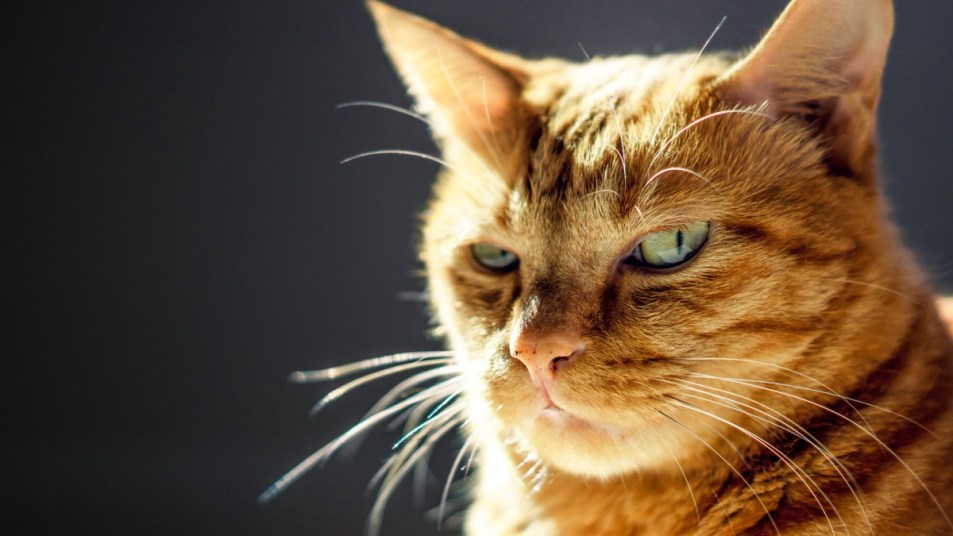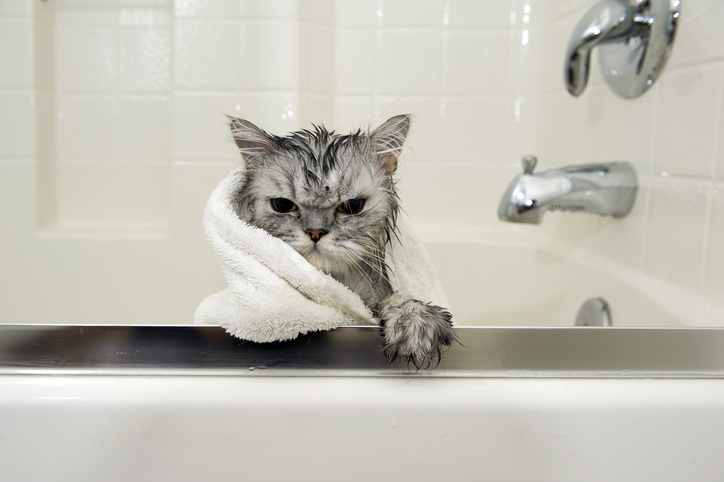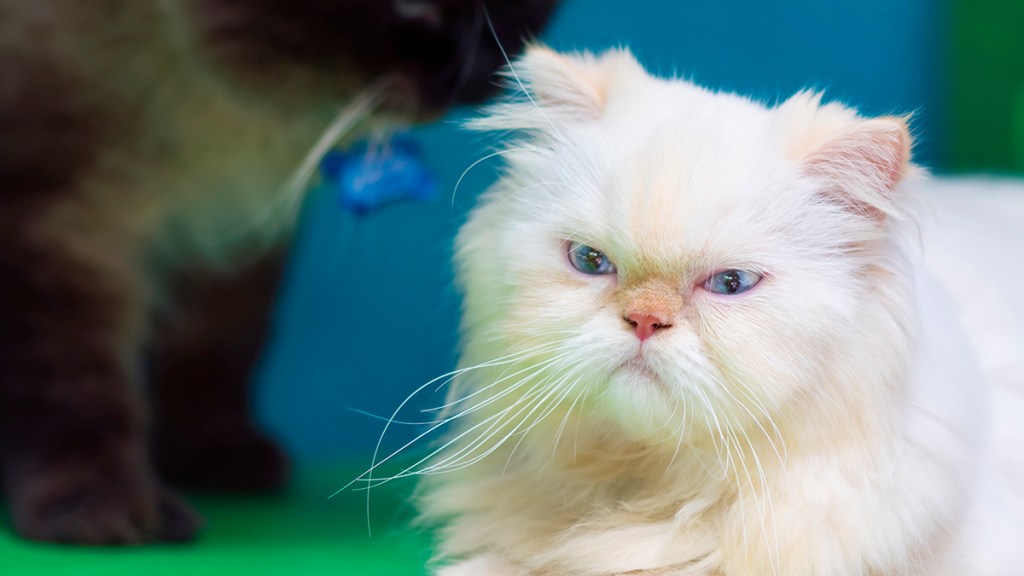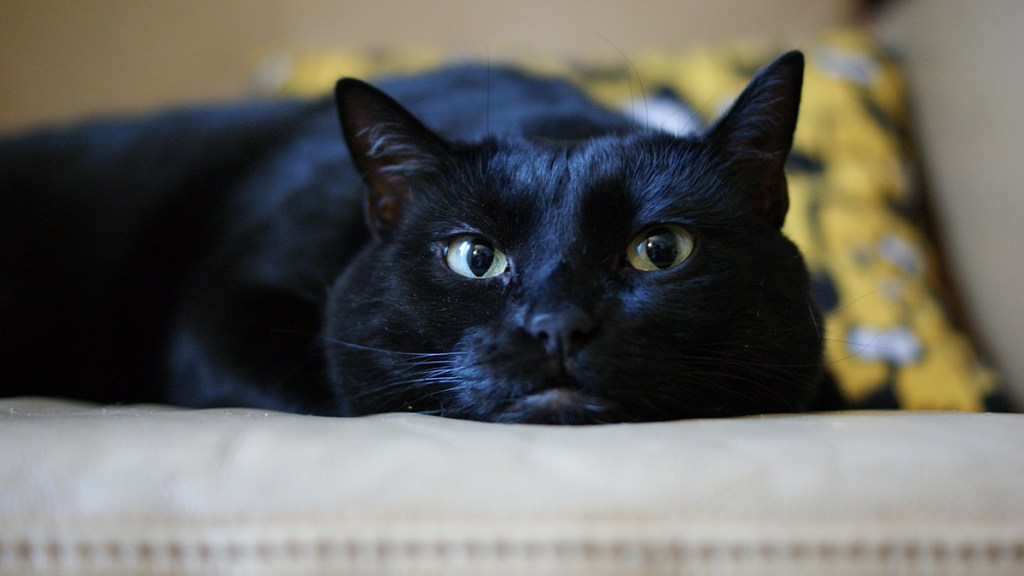Does Your Cat Hold a Grudge? Vets Reveal Just What’s Behind That Grumpy Puss
Plus, pro-approved tricks to make your cat feel better fast

If you have a cat, you may have encountered some “cattitude” from time to time. Maybe you took your kitty to the vet, and she wouldn’t look at you for the rest of the day. Or perhaps she’s on a diet and isn’t getting as many treats as she’d like, which has her giving you the cold shoulder. These instances have probably made you ask yourself, how long does a cat hold a grudge, anyway? We asked animal experts, and as it turns out, cats actually aren’t big grudge holders. So what’s behind that sour puss? Keep reading to see why your cat may be acting grumpy, what you can do to make them feel better and when to be concerned.
Cats and grudges
Can cats hold grudges to begin with? Not exactly, as it turns out. “Cats do have a good memory, and they can form associations between positive and negative experiences,” says Dr. Alex Crow, MRCVS and veterinary contributor to Pet Health Guru. “However, they don’t experience emotions in the same way that humans do, so they don’t hold grudges in the same way that we do.”
“A grudge implies resentment or that the cat feels like they’ve been ‘wronged,'” adds Dr. Mikel (Maria) Delgado, Cat Behavior Expert with Rover. She explains that this isn’t how cats think, but they do remember events that caused them to feel pain or fear. “Cats associate negative feelings with whatever or whoever was near when the painful or scary experience happened. That’s called ‘associative learning,’ and it’s a survival mechanism that all animals have.”
How to tell if your cat is ‘holding a grudge’

Cats don’t hold grudges, per se, but there are a few ways to tell if she’s changing her behavior due to a past negative experience. If she’s exhibiting one of the following, she may be dealing with a remembered stressor, says Dr. Crow.
1. Avoidance
“This is the most common sign that a cat is holding a grudge,” he says. “They may avoid you, certain rooms in the house, or even specific objects.”
2. Body langauge
“If your cat is tense or on edge when you’re around, it may be a sign that they’re not happy with you.” Other signs include fur that stands on end, flattened ears or tail tucked between their legs.
3. Vocalizations
If your cat is reacting to a negative memory or association, she may hiss, grow or meow aggressively.
4. Aggression
“Some cats may become more destructive or aggressive if they’re feeling angry,” notes Dr. Crow. That said, if your cat is acting out of character or seems to be feeling stressed, it’s a good idea to consult a veterinarian to ensure she isn’t dealing with an underlying medical issue.
What causes grumpy cat behavior

There are a variety of potential scenarios that may prompt your cat to “hold a grudge” — or, more accurately, to act differently toward situations or people. (Click through to see why cats knocks things over.)
1. Changes in routine
If you’ve changed something major about your cat’s day-to-day life — maybe you rearranged furniture or fed her at a different time than normal — she may be upset. “Cats are creatures of habit, so changes in their daily routine or environment can be stressful and lead to avoidance behaviors,” says Dr. Crow.
2. Negative experiences
If your cat starts to act avoidant, fearful or angry at the vet’s office, groomer or another place she’s been before, it might indicate that she’s had a bad experience there in the past. “This could involve being restrained, being given painful injections or being in a noisy or crowded environment,” says Dr. Crow. Your cat may also avoid people who have hurt or scared her, even if it was accidental.
3. Too-quick introductions
Did you get a new pet or bring a new friend to your house for the first time? If you didn’t ease your cat into these situations, she may be grumpy. “Being introduced to new people or animals too quickly can cause cats to act differently,” says Dr. Crow. “Cats can be territorial and cautious, so it’s important to introduce them to new people and animals gradually and in a positive way.”
On the first encounter with a new person, it’s important to give your cat space, and not force her into being pet, handled or played with. Be quiet, calm and patient — allow her to take the reins and control the rate at which the relationship grows so she can feel confident.

When it comes to introducing your cat to a new pet, keep them separated at first, gradually adjusting your cat to the new pet’s scent by giving her a towel the new pet slept on. Allow the pets to see each other before they can approach. Slowly and gradually build up to an interaction, and separate them again if there’s any aggression.
How long does a cat hold a grudge?
It depends, according to experts. “How long a cat avoids something they associate with a negative experience will vary depending on the individual cat and the severity of the experience,” says Dr. Crow. “For minor incidents, most cats will forget within a few hours or days. For more serious incidents, it may take longer for the cat to feel comfortable around the person, place or thing again.”
How to get your cat to stop ‘holding a grudge’
The first step to making your cat feel better is determining the underlying reasons for their behavior. Don’t look at it as a grudge, recommends Dr. Delgado, but engage with your cat and try to understand what’s bothering her. Then, you can take steps to make your cat happier and more comfortable.
“In some cases, you can just avoid doing whatever bothered your cat,” says Dr. Delgado. “You can also build a more positive relationship with your cat by playing with them, giving them treats and making sure they have a safe environment that meets all of their needs.” She also recommends listening to your cat’s cues — for example, if she doesn’t like being pet a certain way, ensure she doesn’t get pet that way.
Give them ample time and space to heal, adds Dr. Crow. “Don’t force your cat to interact with you or the thing they’re avoiding. Just let them know you’re there for them when they’re ready.” He also advises keeping your interactions positive and gentle, so your cat can feel comfortable and cared for.
When to consult a professional
If your cat is less affectionate for a few days after, say, moving to a new house, but then starts acting more like herself, it may be a simple case of adjusting to a new environment. But if your cat is showing major signs of stress, a veterinarian should get involved. “Signs of stress include significant changes in behavior or personality, hiding, engaging less with people and showing behaviors like biting or scratching,” says Dr. Delgado. “These aren’t grudges — these signs are a cry for help, and you should reach out to your veterinarian and let them know if you observe them.”
To learn more about cat behavior, click through:
Why Does My Cat Lick My Hair? Vets Reveal the Weirdly Adorable Reason
Cat Trilling: Vets Reveal the Secret Message Behind Those Cute Kitty Chirps
Why Does My Cat Lay On Me? Vets Reveal the 4 Reasons That’ll Make You Feel Extra-Loved
The World’s Smallest Cat Breeds Are Big-Time Adorable — Here Are Photos to Prove It

















